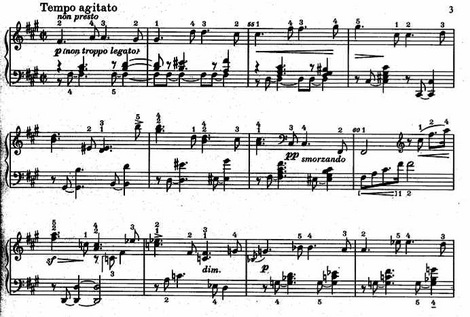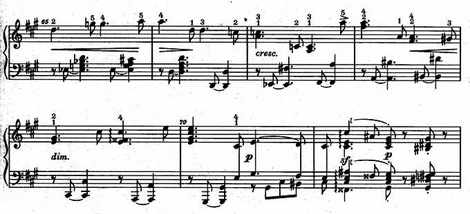[UPDATE: Anwer below] Don’t you wish your doctoral music exams could have gone on forever? I know I do. And here, just to relive a little of the thrill, is a small test reminiscent of same. If you can guess the composer’s name, you and I have a lot to talk about, but failing that, guess 1. the date of composition, and 2. the date of the composer’s birth. Here’s an mp3 of the passage so you don’t have to drag your computer to the piano.
Answers later.
UPDATE: OK, several people (including Alex Ross, who sent me a separate note) figured out that this is the Sonata Op. 61, “Elegie Harmonique,” written in 1807, of Jan Ladislav Dussek (1760-1812). I could have picked a more obscure passage; this is the main theme of his least-completely-unkown sonata. But those who guessed dates after 1840 made the point for me that much of Dussek’s music anticipated trends in Romanticism by several decades. Ironically, the one guess of C.P.E. Bach makes sense too, since some of that composer’s sonatas get pretty weird harmonically, though it’s unlike C.P.E. to keep this kind of rhythmic groove going for so long. The typically Dussekian restatement of the theme on the Neapolitan is rather Lisztian too, though I don’t know whether Liszt knew Dussek’s sonatas; they were popular during his lifetime, but fell into oblivion after his death. The statistic I find most impressive is that in the old series of Norton books The Sonata in the Baroque Era, the Classic Era, etc., Beethoven is discussed in the Classic era book, Dussek in the Romantic – even though Dussek was ten years older than Beethoven. As Howard Allen Craw says of him in Grove, “Dussek is an unjustly neglected composer… As has been frequently observed, much of Dussek’s music resembles that of other composers. Most often, however, these composers are later than Dussek, and such resemblances show him to have been very much ahead of his time in the development of a Romantic piano style.” Thanks to all for your guesses, internet research, and knowledge, class dismissed.


